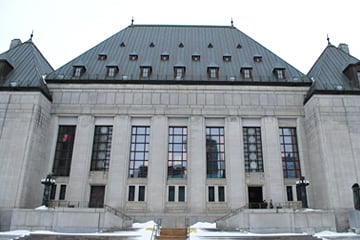The Supreme Court of Canada has found that records of the sensitive testimony of residential school survivors from settlement hearings will be kept confidential.

The Supreme Court of Canada has found that records of the sensitive testimony of residential school survivors from settlement hearings will be kept confidential.
Last year, the federal government asked the Supreme Court of Canada to consider the issue after the Ontario Court of Appeal found the records should be destroyed after 15 years unless survivors chose to have them preserved. The testimony was submitted in the Independent Assessment Process, and included information on the claimants’ medical, psychiatric, financial and incarceration history.
The Supreme Court’s decision will mean records in more than 37,000 claims will not be made public without the claimants’ consent.
“[It’s] a great relief I am sure for those survivors of the residential school tragedy who were promised that their horrific stories of physical and sexual abuse would remain private and confidential and ultimately destroyed unless it was their wish and not Canada’s that they be preserved in an archive,” says Joseph Arvay, counsel to the IAP’s chief adjudicator.
The IAP was set up to provide a second level of compensation to residential schools survivors after a 2006 settlement of a number of class action lawsuits across the country.
In order to receive compensation through the IAP, claimants submitted their harrowing accounts of the abuse they suffered in residential schools under the assurance that the proceedings would be confidential.
The Supreme Court found that the IAP could not have achieved its purpose without these assurances of confidentiality, as it otherwise would not have been possible to secure the participation of either the claimants or the alleged perpetrators. And disclosing the information gathered in IAP hearings could be “devastating” to claimants, their families, witnesses, as well as whole communities, the court found.
“Claimants have said that they would not have participated in the IAP without assurances of complete confidentiality,” Justices Russell Brown and Malcolm Rowe wrote in the unanimous 7-0 judgment in Canada (Attorney General) v. Fontaine.
“This was confirmed by the director of Settlement Agreement Operations West, who stated that claimants were often reticent to disclose all allegations due to feelings of shame and embarrassment, and that those concerns were allayed by assurances of confidentiality.”
The dispute arose when the IAP’s chief adjudicator asked the Ontario Superior Court for direction on what should happen to the records once the process concludes. A judge found they should be destroyed after 15 years unless individual claimants objected to that, and the Court of Appeal upheld that decision.
In its appeal, the federal government argued that the judge did not have jurisdiction to order the documents’ destruction as they are under the government’s control pursuant to the Access to Information Act and the Privacy Act. The government also contented that the assurances of confidentiality “cannot justify the exclusion of documents from the statutory scheme” and that IAP adjudicators were wrong to promise “that the laws of Canada would not apply”.
The Supreme Court, however, found that the agreement that came out of the settlement — the Indian Residential Schools Settlement Agreement — had given the judge supervisory jurisdiction.
The country’s top court also ruled that the lower court decisions struck the appropriate balance.
“The supervising judge’s order, as modified by the majority of the Court of Appeal, charts an appropriate course between the Scylla of potentially unwanted destruction and the Charybdis of potentially injurious preservation,” the decision said.
Lawyers representing some of the respondents say the case was about ensuring that survivors retained control of sensitive testimony given in a private setting rather than the destruction of historical documents. It was important that it be confirmed that the survivors are the only ones with the right to decide whether their testimony is disclosed, says Hugo Prud’homme, who was counsel for Inuit Representatives.
The Supreme Court recognized that the order might be inconsistent with the wishes of claimants who have died and who will not have the choice of whether to preserve their own records. But the court found that a “perfect outcome” in the circumstances was “simply not possible.”
“In our view, however, the destruction of records that some claimants would have preferred to have preserved works a lesser injustice than the disclosure of records that most expected never to be shared,” the decision said.
Moira Dillon, who was the Ottawa agent for counsel representing the Assembly of First Nations, independent counsel and Inuit Representatives, says the decision was reasonable and consistent with the expectations of the residential school survivors who had been assured the process would be confidential.
“I think today’s decision reaches a fair balance between the need for confidentiality and the interests of the Crown in preserving these records, while at the same time ensuring that individual survivors have a role in deciding how the record of their personal stories will be treated,” says Dillon, a lawyer with Supreme Law Group.
“A settlement process of this nature would be completely ineffective if abuse victims were unable to rely on assurances of confidentiality. It’s a question of trust.”
The Department of Justice referred questions about the Supreme Court’s decision to the Indigenous and Northern Affairs Canada, which did not provide comment before deadline.










